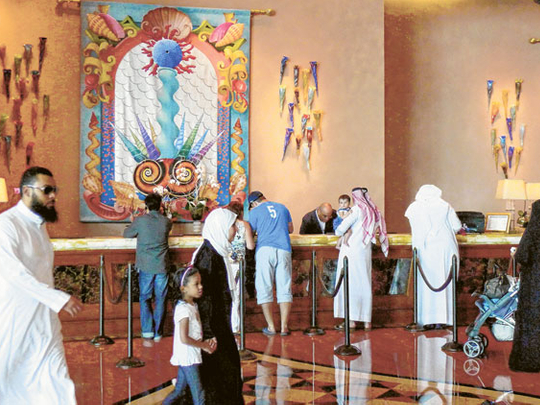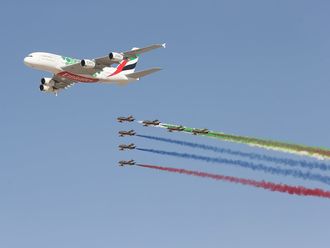
Dubai: Hotels in the emirate posted the highest room yield or RevPAR (revenue per available room — an industry benchmark) increase of 22 per cent in July in the Middle East, according to a new study.
The Ernst & Young Middle East Hotel Benchmark Survey revealed that hotels in Dubai recorded a RevPAR of Dh470 in July over the same period a year earlier, when the RevPAR was Dh385.
The emirate's hotels also topped the region's occupancy charts for the month with 80.8 per cent against 70.3 per cent experienced in July 2010.
Some other markets in the region saw massive drops in occupancies, the lowest being 35 per cent for Cairo's city hotels. The Egyptian capital's hotels also recorded the region's highest revenue drop of 53.3 per cent year on year in July.
Average room rates, meanwhile, in Dubai hotels climbed slightly — by 6.2 per cent in the period to Dh582 compared to Dh548 in July last year.
As Yousef Wahbah, Mena Head of Transaction Real Estate at Ernst & Young, points out, "Dubai remains one of the most steadily growing markets in the region. Egypt, especially Cairo and Sharm Al Shaikh, registered the strongest declines in terms of occupancy and room yields."
Lebanon hotels, meanwhile, owing to the political tensions, saw their July year-on-year revenue declining hugely by 31.9 per cent. "The surprisingly large decline in occupancy and room yields in Lebanon in July 2011 can be attributed to the fact that a large number of GCC tourists visiting the country returned home for Ramadan, marking the end of the summer break, said Wahbah. He added that Europe and Turkey are competing with Lebanon aggressively as a tourist destination.
"The fall in prices in the EU has made it increasingly attractive for tourists, especially from the GCC, and Lebanon could bear the brunt of this shift in consumer tastes this summer," Wahbah said.
Abu Dhabi hotels
Abu Dhabi hotels, meanwhile, saw occupancies increase marginally to 71 per cent in July compared to 69 per cent in July 2010, as per the E&Y analysis. However, revenues declined by 5.3 per cent to Dh388 from Dh409 in July last year.
The average room rates in Abu Dhabi hotels, too, declined during the same period by eight per cent to Dh544 from Dh591 a year earlier.
According to yet another survey by French research firm, MKG Hospitality, many hotel markets in the Middle East and North Africa (Mena) revealed solid signs of growth in July while others continue to be affected by the unstable situation in the region.
As per the firm's analysis, key hotel performance indicators for the Mena region post good signs of improvement.
"The good news is that the tide seems to be changing for the Mena region as a whole. Although some countries are still experiencing internal issues, the rest are no longer feeling the brunt," Vanguelis Panayotis, Director of Development at MKG Hospitality, told Gulf News in an e-mailed statement.
Positive performances
UAE hotels, according to the MKG survey, continued to post positive performances in July, with "over 20 per cent RevPAR growth" in July, driven by a significant increase in occupancy rate — up by over 13 percentage points over the corresponding period last year.
"The UAE records the largest occupancy rate increase in all of Mena for the second consecutive month. Indeed, this is a firm sign of market consolidation, perhaps gradually reliving to its former glory. Dubai is heading this momentum, especially leisure-resort oriented locations such as Jumeirah Beach," Panayotis said.
Turkey, meanwhile, emerged the Mena region's star performer in July in terms of growth, monthly and year-to-date, with the second highest actual occupancy rate and RevPAR. Turkey's RevPAR in July alone increases by over 22 per cent, solely driven by Average Daily Rate (ADR), the MKG report stated. It added that at year-to-date, the country's RevPAR increased by over 23 per cent, driven mostly by ADR.
"Hoteliers here knew all too well that European holiday-makers would be a lot more interested in Turkey over other competing destinations in the region. In fact, so many tour groups had to be switched over this year," said Panayotis.
Kuwait, on the other hand, recorded exceptional RevPAR growth in the period at almost 23 per cent — rebounding from a drop this time last year, according to the study. This was fuelled by a nine-point increase in occupancy rates and 4.5 per cent in average daily rates.
"Kuwait also manages to remain one of the better GCC markets at year-to-date, with over 7 per cent RevPAR growth," MKG Hospitality said in its report.
Further, boosting RevPAR by over 14 per cent in July, Saudi Arabia remained the best performing market in the GCC at year-to-date and is also expected to do well in the coming months, according to MKG estimates, Qatar and Oman, meanwhile, recorded RevPAR increases of 7.5 per cent each.
"These three GCC markets are the only ones to record growth-on-growth, that is, performing well in both July 2011 and July 2010," the report stated, further terming Bahrain as the only "unstable" GCC market still struggling with a significant drop in demand and prices.












